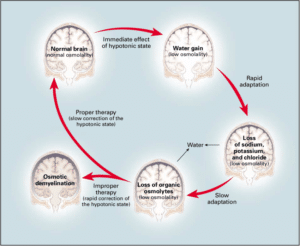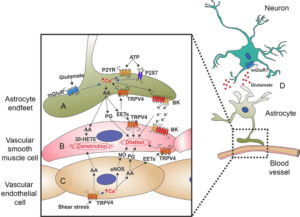
As a Brain Injury Rehabilitation Center in Chennai, we’ve noticed that brain injury patients suffer many challenges on the road to recovery. They have to relearn several physical as well as mental functionalities. For many patients, there is one additional hurdle to overcome – hyponatremia.

What is Hyponatremia?
A common and very serious health condition in patients with brain injury, Hyponatremia is the overhydration of the body. The sometimes-life-threatening condition causes the brain to swell, which leads to seizures and cognitive issues. Hyponatremia commonly happens in elderly patients or people with pathological conditions such as:
Right now, it is near impossible to detect how hyponatremia happens in the body. That said, McGill University has done a new study that explains:
TRPV4 and regulation of blood vessels in the brainHow hyponatremia happens in a person is shrouded in uncertainty, but researchers believe that a fault in the brain’s hydration sensing system may be the reason. The fault, according to researchers, is that the brain doesn’t detect overhydration, in the same manner, it does dehydration.
When the body is overhydrated, Trpv4 is activated. Trpv4 is a calcium channel found in the glial cell. This channel, once activated, surrounds neurons that sense hydration. Think of it as a gatekeeper that is meant to keep the balance of water in a body in check.

The actual process of detecting overhydrated state, as per the published article in the journal Cell Reports, is:
In simpler words, when there is an imbalance of water, a cellular protector in our body detects it. Then it transfers the information which turns off the electrical activity in neurons that are meant to detect overhydration.
This study by McGill University is only the first step in understanding overhydration and how it can lead to the dangerous condition of hyponatremia. More research is not only essential but also severely needed to prevent complications, particularly in people who suffer from brain injury.
When the body of a brain injury patient at our Chennai rehab centre is unable to detect overhydration, it leads to a higher risk. This is particularly true if hyponatremia appears. The condition adds one more layer of uncertainty in the recovery of the patient because the brain is swollen to a fatal level.
The rehab of a traumatic brain injury patient is already long, frustrating and high on cost for not only the individual but also their friends and family. With hyponatremia in the mix, all these issues compound. The patient faces physical risks and on top of it has financial challenges due to a costly medical bill, loss of earning and long-term care.
When it comes to dehydration, there is no dearth of information. We can find it with a click of a few buttons. The same cannot be said for overhydration and the complications it can lead to in people.
At HAMSA Rehab Chennai, we are often asked if drinking too much water can be harmful. In healthy people, overhydration is rarely a fatal condition. But for patients like those at our Brain Injury Rehabilitation Center in Chennai, it is a significant risk. Excess fluid accumulation, i.e., overhydration, results in:
Both are perilous for patients. So, care should be taken at all times that brain injury patients are given only adequate amounts of water. If you are unsure or have doubts about what is sufficient hydration for a person who has suffered a brain injury, please get in touch with a healthcare practitioner. As a care-taker of a brain injury patient, they will guide you through the right steps.